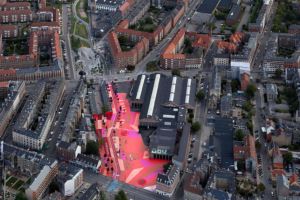News
Nørrebro urban park wins Aga Khan Award for Architecture
This article is more than 9 years old.
Superkilen is praised for promoting diversity in the socially-challenged neighbourhood

The extraordinary urban landscape of Nørrebro (photo: Bjarke Ingels Group)
Superkilen, a 33,000 sqm large public urban park in the Copenhagen district of Nørrebro, has won the internationally-renowned Aga Khan Award for Architecture for promoting integration across lines of ethnicity, religion and culture.
The park was designed by the Bjarke Ingels Group and officially opened in June 2012.
The Aga Khan Foundation appreciated particularly the architects’ decision to “approach the project as an exercise in extreme public participation”, which “garnered suggestions for objects representing the over 60 nationalities present locally to be placed in the area”.
READ MORE: So many people lent a hand to give us parklife!
Mix of humour, history and pride
The park consists of three zones: the Red Square with sport sites such as football and basketball areas; the Green Park with a grassy children’s playground; and the Black Market with an area for picnics and cultural events.
“In a time of growing global uncertainty it has become fashionable to talk about worlds – the Third World, the Islamic World, the Arab World – as if they constitute a parallel universe that is not connected to the rest,” writes the foundation.
“Superkilen, which is a new urban park in one of Copenhagen’s most diverse and socially-challenged neighbourhoods, rejects this perception in an empathetic way with a strong mix of humour, history and pride.”
READ MORE: Danish architects to design Californian-based 1,200 km/h train
Rewarding community based planning
The Aga Khan Award for Architecture was granted also to other projects, including a mosque in Dhaka (Bangladesh), a friendship centre in Gaibandha (Bangladesh), a children’s library and art centre in Beijing (China), a bridge for pedestrians in Tehran (Iran), and a university building in Beirut (Lebanon).
The Aga Khan Architecture Prize is awarded every three years and includes a million dollar reward that is divided among all the winners.
The program was established in 1977 by the Aga Khan, the 49th hereditary imam for Muslims following the Shia tradition.
It celebrates architecture ideas with a focus on sustainability, human scale, climate adaptation and quality of life.










































